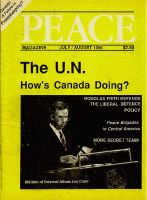
Peace Magazine Aug-Sep 1988, page 26. Some rights reserved.
Search for other articles by Subir Guin here
A Report on Barrie Zwicker's Science for Peace Lecture
The doomsday clock on the cover of the Bulletin of the Atomic Scientists, which has stood for some years at three minutes to midnight, was recently turned back by another three. The editors felt encouraged by the signing of the Intermediate Nuclear Forces (INF) Treaty and the improved East-West relations.
Barrie Zwicker disagrees. "The risk of war can only be removed," he told a Toronto audience last spring, "when the institution of war is itself abolished." Humanity's development is thwarted by militarism. The privileged classes are about the only beneficiaries of it.
About half the U.S. tax dollars are spent on wars past, present, and future. Legislators dare not oppose "defence" industries, lest they be accused of taking away jobs. Senator Edward Kennedy, for instance, voted for the nuclear freeze, yet backed appropriations for the B-1 bomber because the Pentagon made sure that key components were manufactured in his electoral district.
The INF Treaty was barely ratified by Congress while the Gorbachev-Reagan summit was in progress. Had this event not commanded global attention, conservatives senators might have blocked ratification with "killer amendments."
Rolland Perry, a British journalist, tells in his book Hidden Power: The Programming of a President how the Reagan team assembled a sophisticated intelligence system to influence American public opinion. Analyzing ten years of census data and opinion polls, it divided the electorate into clusters with distinct characteristics. Further polling enables the analysts to predict how each category will respond to changes in policy. Based on this information, the team works to transform opinion and voting behavior.
Last fall a Times-Mirror poll report paid particular attention to the "seculars"-- a cluster of white, middle-aged, and well-educated citizens who profess no religious beliefs and are strongly committed to social issues. They are heavily concentrated along East and West coasts. Almost half attend classical music concerts, ballet, and theatre on a regular basis.
These people are not militant anti-communists. One would expect them to show a high voter turnout, but their record is only slightly above average. Both parties want their votes, but Republicans believe they can count on the "seculars" only if they conclude an arms agreement with the Soviets. Such a pact also serves to declaw the peace movement.
Current trends, therefore, are meant to suggest a reduction in East-West tensions, while in fact the arms chase continues, with provocative Western military buildups in the North Pacific and Arctic regions. Nuclear weapons testing continues unabated, along with cruise testing and SDI research. All this shows how the INF deal masks the real "business as usual" status of our military-academic-industrial-media (MAIM) complex.
The mainstream (or, as Zwicker calls it, "malestream") media tells us that the INF agreement eliminates an entire category of weapons in the 500/5000 km range. However, this is not accurate. French and British weapons in this class are untouched, as are NATO's air and submarine-launched intermediate range missiles.
NATO has already given notice it will upgrade its arsenals to compensate for treaty cutbacks. The British and French are continuing their own plans to crank up their nuclear capability. Possible new weapons include 380 new SLCMs slated for deployment in Europe by the mid-nineties; 400 more neutron warheads for Europe and the development of "standoff" nuclear missiles, designed to be carried by fighter aircraft and capable of reaching Soviet targets. The B-2 stealth bomber reportedly was test flown in April and a new stealth warship is being developed for the U.S. Navy.
NATO's sixteen nations with a collective population of 530 million wield an aggregate GNP almost three times that of the seven Warsaw Pact countries, representing 383 million citizens. Not mentioning the West's technological advantage.
To ensure funding for military projects, a massive program of disinformation and manipulation continues. Some of the old bogus arguments are recycled: Certain weapons, for instance, serve as bargaining chips. Or, the harder we bargain, the sooner the Soviets will fall into line. Another favorite is the need to build up conventional fire power to compensate for nuclear arms reductions.
What can we do to counter this? Zwicker cited E.P. Thompson, who suggests that we:
Besides learning, we must keep on working. We need to understand the key role of information -- how and by whom it is gathered, disseminated, withheld and manipulated. p
Barrie Zwicker is a critic and media resource producer.

Peace Magazine Aug-Sep 1988, page 26. Some rights reserved.
Search for other articles by Subir Guin here